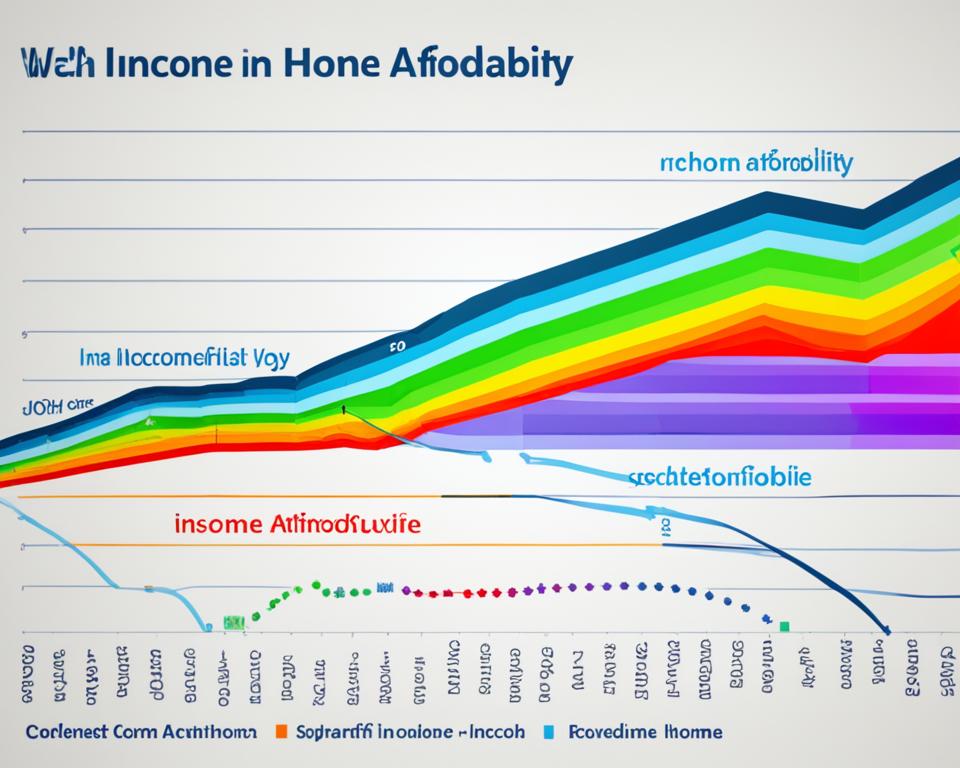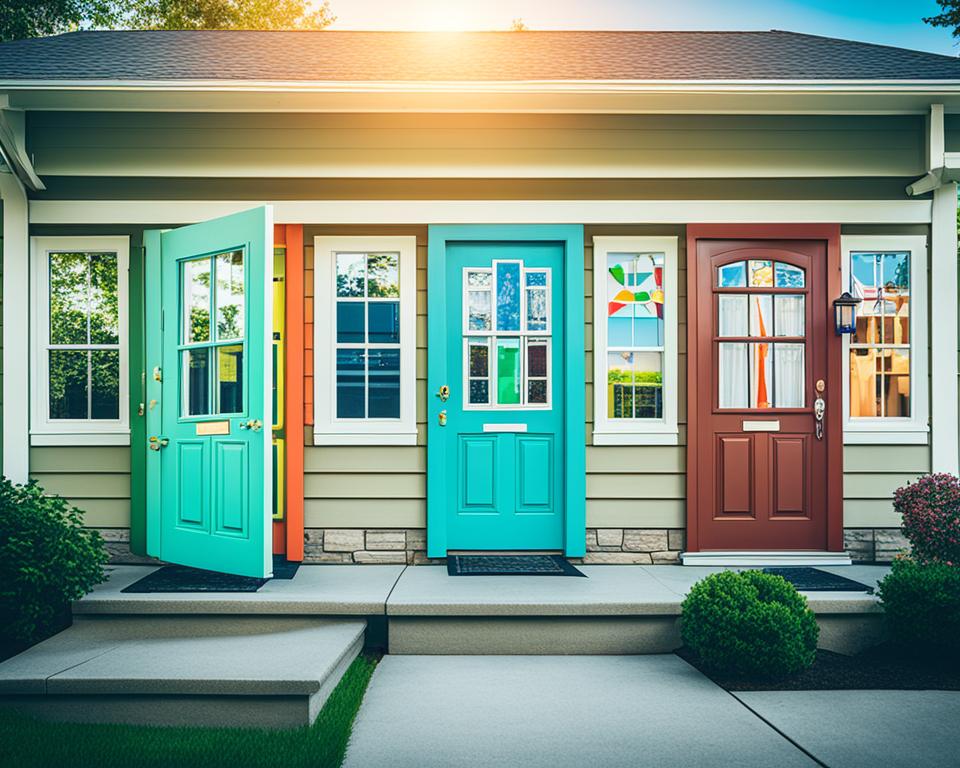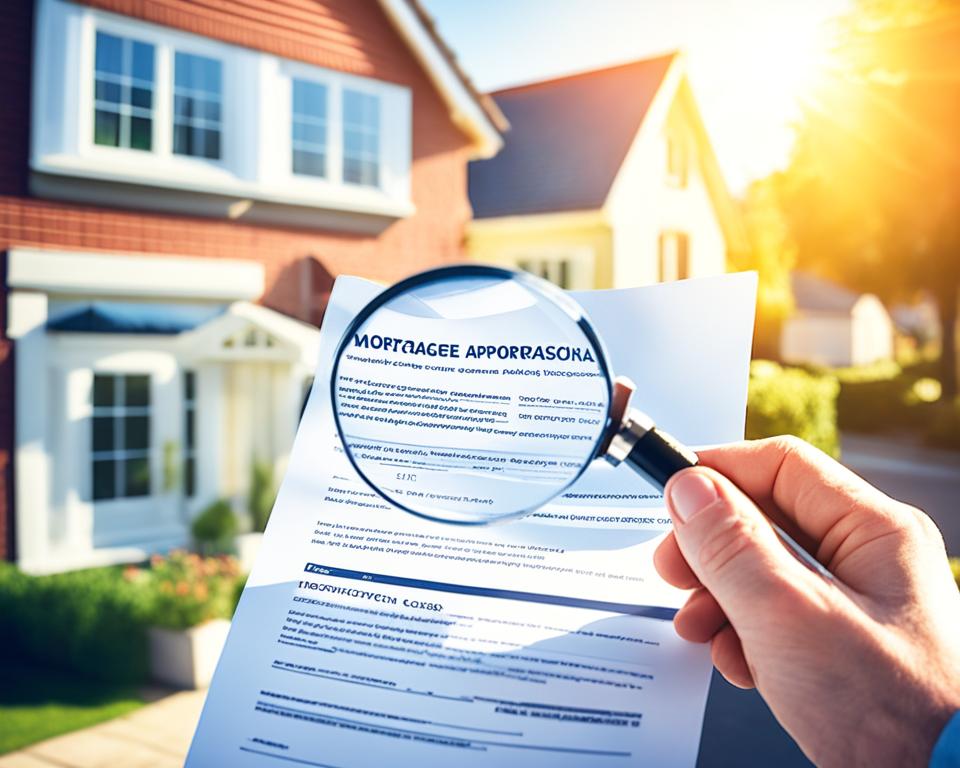Buying a house is an exciting milestone, but it requires careful consideration of your credit situation. To navigate the home buying process successfully, it’s important to understand how credit affects your ability to purchase a home. This article will provide you with essential tips and must-knows about credit for home buying.
Key Takeaways:
- Knowing your mortgage credit score is crucial in determining your eligibility for home buying loans and securing favorable terms.
- Saving early and setting a realistic budget is essential for covering down payments, closing costs, and move-in expenses.
- Researching and comparing mortgage options will help you find the loan that best fits your financial situation.
- Take advantage of first-time home buyer assistance programs and explore down payment and closing cost assistance options.
- Choosing a reputable real estate agent and narrowing down your ideal house type and neighborhood are important steps in the home buying process.
Start Saving Early
When preparing to buy a house, it’s crucial to start saving early. The upfront costs associated with homeownership can be significant and include the down payment, closing costs, and move-in expenses. By planning and budgeting ahead of time, you can ensure that you have enough funds to cover these expenses and make your home buying journey smoother.
Calculate Your Down Payment
The down payment is one of the largest expenses when purchasing a home. It’s the upfront payment you make towards the purchase price, and it’s typically a percentage of the total amount. Use a down payment calculator to determine how much you need to save based on the purchase price of the home and your desired down payment percentage. This will help you set a savings goal and track your progress along the way.
Automate Your Savings
Once you’ve established your savings goal, make saving easier by automating transfers from your checking account to a dedicated savings account. Set up a recurring transfer on a monthly or bi-weekly basis to ensure that a portion of your income goes directly towards your home savings. This will help you stay consistent and disciplined in your saving habits.
Budget for Closing Costs and Move-In Expenses
In addition to the down payment, you’ll need to budget for closing costs and move-in expenses. Closing costs typically include fees for loan origination, appraisal, title insurance, and escrow services. They can range from 2% to 5% of the purchase price. Move-in expenses include costs such as furniture, appliances, and any immediate repairs or renovations you may want to make. Factor these expenses into your savings plan to ensure you have enough funds to cover them.
Quotes:
“Starting to save early is essential for anyone looking to buy a home. It gives you the financial freedom and flexibility to handle all the upfront costs associated with homeownership.” – Jane Richards, Financial Advisor
Tips to Remember:
- Use a down payment calculator to set a savings goal based on the purchase price and desired down payment percentage.
- Automate transfers from your checking to a dedicated savings account to make saving easier.
- Budget for closing costs and move-in expenses in addition to the down payment.
“By saving diligently and budgeting wisely, you can make your dream of owning a home a reality. It may require sacrifices, but the reward of homeownership is worth it.” – Mark Johnson, Mortgage Specialist
Decide How Much Home You Can Afford
Before starting your home search, it is crucial to determine how much home you can afford. To avoid falling in love with a home that is beyond your means, consider factors such as your income, debt, down payment, and credit score. To make this process easier, utilize a home affordability calculator. By setting a price range based on your financial situation, you can ensure that you are searching for homes within your budget.
Calculating Home Affordability
To estimate how much home you can afford, consider the following factors:
- Your Income: Determine your monthly income, including any additional sources of income or financial support.
- Your Debt: Evaluate your existing debt obligations, such as student loans, car loans, and credit card debt.
- Your Down Payment: Decide on the amount you can comfortably put towards a down payment. A larger down payment can lower your monthly mortgage payments.
- Your Credit Score: Your credit score plays a significant role in determining your mortgage interest rate. A higher credit score can result in a lower interest rate, saving you money over time.
Once you have gathered this information, use a home affordability calculator to determine a realistic price range for your preferred home. This tool will consider your income, debt, down payment, and credit score to provide an estimated range of affordable homes.
Remember, while it can be tempting to stretch your budget to buy a dream home, it is essential to consider the long-term financial implications. Owning a home should be a fulfilling experience, not a financial burden. By being mindful of your affordability, you can make a wise decision and avoid stress and financial hardships in the future.
Image:

Check and Polish Your Credit
Your credit score is a crucial factor in determining your eligibility for a mortgage. To ensure you’re in good standing, follow these steps to check and polish your credit:
Obtain Free Copies of Your Credit Reports
Start by obtaining free copies of your credit reports from the three major credit bureaus – Equifax, Experian, and TransUnion. Review each report carefully to identify any errors or discrepancies.
Dispute Any Errors
If you spot any errors on your credit reports that could negatively impact your credit score, it’s important to dispute them. Contact the credit bureaus to initiate the dispute process and provide any necessary supporting documentation.
Make On-Time Bill Payments
Consistently paying your bills on time demonstrates responsible financial behavior and positively impacts your credit score. Set up reminders or automate payments to ensure you never miss a due date.
Keep Credit Card Utilization Low
High credit card utilization can negatively affect your credit score. Aim to keep your credit card balances below 30% of your available credit limit. Consider paying down balances strategically to improve your credit utilization ratio.
Monitor Your Credit Score Regularly
Stay vigilant about changes to your credit score by regularly monitoring it. This allows you to detect and address any sudden drops or anomalies promptly.
| Benefit | Action |
|---|---|
| Access your credit reports | Obtain free copies from Equifax, Experian, and TransUnion |
| Dispute errors | Contact credit bureaus to correct any discrepancies |
| Make on-time bill payments | Set up reminders or automate payments |
| Manage credit card utilization | Keep balances below 30% of available credit limit |
| Track your credit score | Monitor changes and stay informed |
Explore Mortgage Options
When it comes to financing your dream home, exploring different mortgage options is essential. Homebuyers have a variety of choices, including conventional mortgages, FHA loans, USDA loans, and VA loans. Each option has its own advantages and considerations, so it’s important to understand the differences before making a decision.
Conventional mortgages are traditional home loans that are not guaranteed or insured by the government. They typically require a higher credit score and a larger down payment compared to other loan programs. Conventional mortgages offer flexibility in terms of loan terms, allowing borrowers to choose among popular options such as 15-year or 30-year fixed-rate mortgages.
If you’re looking for a loan with more lenient credit requirements or a lower down payment, FHA loans may be a viable option. Backed by the Federal Housing Administration, FHA loans are designed to help individuals with moderate income levels and lower credit scores achieve homeownership. These loans often require a down payment as low as 3.5% of the home’s purchase price.
USDA loans, provided by the United States Department of Agriculture, are intended for individuals and families looking to purchase homes in rural areas. These loans offer attractive terms such as zero down payment and lower interest rates. To qualify for a USDA loan, your income must fall within certain limits, and the property must meet specific location and eligibility criteria.
For eligible veterans and active-duty service members, VA loans provide favorable terms and conditions. These loans are guaranteed by the Department of Veterans Affairs and offer benefits such as no down payment, competitive interest rates, and limited closing costs. If you’ve served in the military, a VA loan may be an excellent choice for financing your home purchase.
When considering mortgage options, it’s important to evaluate different loan terms as well. Some homebuyers prefer the stability of a fixed-rate mortgage, where the interest rate remains the same throughout the loan term. Others may opt for an adjustable-rate mortgage (ARM), which offers a lower initial interest rate that can change over time. Depending on your financial goals and future plans, choosing the right mortgage term can help you save money and achieve long-term financial stability.
Comparison of Mortgage Options
| Loan Type | Down Payment | Credit Score Requirement | Loan Terms |
|---|---|---|---|
| Conventional Mortgages | Varies (typically 3% to 20%) | Good to Excellent | Various options (e.g., 15-year, 30-year fixed-rate) |
| FHA Loans | As low as 3.5% | Fair to Good | Various options (e.g., 15-year, 30-year fixed-rate) |
| USDA Loans | 0% down payment | Varies based on lender | Fixed-rate options |
| VA Loans | 0% down payment | Varies based on lender | Various options (e.g., 15-year, 30-year fixed-rate) |
Understanding the pros and cons of each mortgage option is crucial for making an informed decision. Consider your financial situation, credit score, down payment capability, and long-term goals when evaluating these options. Consulting with a mortgage professional can also provide valuable insights and guidance tailored to your specific needs.
Remember, finding the right mortgage is an important step towards homeownership. By exploring various mortgage options and understanding their unique features, you can make an educated choice that suits your financial circumstances and sets you on the path to successfully purchasing your dream home.

Research First-Time Home Buyer Assistance Programs
When it comes to purchasing your first home, financial assistance programs can make a significant difference. Many states, cities, and counties offer specialized programs designed to support first-time home buyers. These programs provide various benefits such as low-interest-rate loans, down payment assistance, closing cost assistance, and mortgage credit certificates.
By exploring these programs, you can potentially save money and make your dream of homeownership more attainable. Here are a few key options to consider:
Low-Interest-Rate Loans
First-time home buyer programs often provide access to low-interest-rate loans. These loans typically have favorable terms and conditions, making them more affordable for buyers with limited resources. Research the specific programs available in your area, as loan terms and eligibility criteria may vary.
Down Payment Assistance
Saving for a down payment can be a significant barrier for many first-time home buyers. Luckily, some assistance programs offer down payment grants or forgivable loans to qualified applicants. These resources can help you bridge the financial gap and achieve your goal of homeownership faster.
Closing Cost Assistance
In addition to the down payment, closing costs can also pose a financial challenge for first-time buyers. Certain home buyer assistance programs may offer assistance with these costs, reducing the burden on your finances. This support can make a substantial difference in making your home purchase more affordable.
Mortgage Credit Certificates
Mortgage credit certificates (MCCs) are another valuable resource for first-time home buyers. These certificates provide eligible buyers with a tax credit based on a portion of their mortgage interest payments. By reducing your overall tax liability, MCCs can help you save money each year.
Researching and understanding first-time home buyer assistance programs is essential to maximizing your options. Start by exploring the options available in your area and check whether you meet the eligibility requirements. Taking advantage of these programs can potentially save you thousands of dollars and make your dream of homeownership a reality.
| Program Name | Benefits | Eligibility Criteria | Contact Information |
|---|---|---|---|
| State Home Buyer Program | Low-interest-rate loans Down payment assistance |
Income limits First-time home buyer |
Website: www.statehomebuyerprogram.com Phone: 555-123-4567 |
| City Homeownership Program | Closing cost assistance Mortgage credit certificates |
Residency requirements Credit score minimum |
Website: www.cityhomeownershipprogram.com Phone: 555-987-6543 |
| County First-Time Buyer Initiative | Down payment grants Interest rate subsidies |
Property location Income restrictions |
Website: www.countyfirsttimebuyer.com Phone: 555-456-7890 |
Compare Mortgage Rates and Fees
When it comes to getting a mortgage, it’s essential to shop around and compare mortgage lenders to ensure you find the best deal. By comparing loan estimates, you can get a clear picture of interest rates and potential fees, allowing you to make an informed decision that aligns with your financial goals.
Loan Estimates:
Loan estimates provide detailed information about the terms and costs associated with a mortgage. They include essential details such as the interest rate, origination fees, discount points, and closing costs. Reviewing and comparing loan estimates from multiple lenders is crucial in finding the most favorable terms for your mortgage.
Interest Rates Comparison
Interest rates play a significant role in determining the overall cost of your mortgage. A small difference in interest rates can lead to substantial savings over the life of your loan. By comparing the interest rates offered by different mortgage lenders, you can identify the most competitive options.
Origination Fees and Discount Points
Origination fees are charged by lenders to cover the cost of processing your mortgage application. They are usually expressed as a percentage of the loan amount. Review the loan estimates and compare the origination fees offered by different lenders. Lower origination fees can help reduce your upfront costs.
Discount points, on the other hand, can be used to buy down your interest rate. Each discount point typically costs 1% of the loan amount and can lower your interest rate by a certain percentage. Comparing discount points can help you decide whether it’s beneficial to pay upfront to secure a lower interest rate.
Closing Costs
Closing costs encompass various fees and expenses associated with finalizing the mortgage. These costs can include appraisal fees, title insurance, attorney fees, and more. When comparing loan estimates, pay close attention to the closing costs listed. Some lenders may offer higher interest rates with lower closing costs, while others may have lower interest rates but higher closing costs. It’s important to weigh all factors to determine the most cost-effective option for you.
It’s worth noting that you can also negotiate with sellers to see if they are willing to contribute towards your closing costs. This can help alleviate some of the financial burden associated with closing on your new home.

Comparing mortgage rates and fees is crucial when it comes to finding the best mortgage offer. By taking the time to review loan estimates, consider interest rates, origination fees, discount points, and closing costs, you can potentially save thousands of dollars over the life of your loan. Don’t rush the decision-making process. Instead, carefully evaluate your options and choose a mortgage that aligns with your financial needs and goals.
Gather Your Loan Paperwork
Before being approved for a mortgage, it’s essential to gather all the necessary paperwork to verify your financial information. This includes providing proof of income, bank statements, debt documentation, and credit history. Being organized and prepared will streamline the application process and help lenders assess your financial stability. Here is a breakdown of the documents you will need to gather:
1. Proof of Income
Provide recent pay stubs, W-2 forms, or income tax returns to demonstrate your earning capacity to the lender. Consistent and verifiable income is a key factor in determining your eligibility for a mortgage.
2. Bank Statements
Lenders typically require several months’ worth of bank statements to assess your financial history. These statements can reveal your spending patterns, savings, and overall financial stability.
3. Debt Documentation
Include documentation of any outstanding debts, such as credit card statements, student loans, car loans, or personal loans. This information helps lenders assess your debt-to-income ratio and your ability to manage additional financial obligations.
4. Credit History
Obtain a copy of your credit report from all three major credit bureaus. Review your credit history for accuracy and address any discrepancies promptly. Lenders rely on your credit score to evaluate your creditworthiness and determine the loan terms and interest rates you qualify for.
By gathering and organizing these important documents, you’ll be well-prepared to provide lenders with the necessary information to evaluate your loan application. This level of preparedness will expedite the process and increase your chances of obtaining a favorable mortgage offer.
Get a Preapproval Letter
Obtaining a mortgage preapproval letter is an essential step in the homebuying process. This letter provides you with a clear understanding of how much a lender is willing to lend you under specific terms. It not only demonstrates to sellers that you are a serious buyer but also gives you a significant advantage over other buyers.
When you have a preapproval letter in hand, sellers are more likely to consider your offers seriously. They see you as a qualified buyer who has taken the necessary steps to secure financing. This can make a crucial difference, especially in competitive real estate markets where multiple offers are common.
Applying for preapproval allows you to assess different lender offers and choose the one that best fits your financial needs. By getting preapproval from multiple lenders within a limited timeframe, you can compare interest rates, loan terms, and fees to find the best mortgage option for you.
Keep in mind that the preapproval process involves a credit check and a thorough review of your financial documents. Lenders will evaluate your creditworthiness, income, and debt before issuing a preapproval letter. Therefore, it’s important to have your financial documents in order, including bank statements, tax returns, and proof of income.
Getting a preapproval letter not only helps you set a realistic budget for your home search but also streamlines the buying process. With this valuable document in hand, you are well-equipped to make informed decisions and confidently negotiate when you find your dream home.

Choose a Real Estate Agent Carefully
When it comes to finding your dream home and navigating the complex processes of negotiation and closing, selecting a reputable real estate agent is crucial. A knowledgeable and experienced agent can provide invaluable guidance and support throughout your homebuying journey. Consider the following tips to help you choose the right real estate agent:
Ask for Referrals from Recent Homebuyers
One way to find a reliable real estate agent is by asking for referrals from friends, family, or colleagues who have recently purchased a home. Their firsthand experiences can provide valuable insights and help you identify agents who have successfully assisted buyers in your market.
Interview Multiple Agents
It’s important to interview multiple real estate agents before making your decision. During the interview, ask about their experience working with first-time buyers and inquire about their market knowledge and expertise. A good agent should be able to provide you with comprehensive information about the local housing market and current trends.
Inquire About Strategies for Finding Off-Market Homes
In a competitive real estate market, finding off-market homes can give you an advantage. Ask potential agents about their strategies for discovering off-market properties. A proactive agent who has established relationships with other professionals in the industry may have access to exclusive listings that are not publicly available.
By choosing a real estate agent with referrals, experience, and market knowledge, you can ensure that you have a trusted partner by your side throughout the homebuying process.
| Benefits of Choosing a Reputable Real Estate Agent | Why It Matters |
|---|---|
| 1. | Access to a network of industry professionals and resources. |
| 2. | Expert guidance in navigating the complex paperwork and legalities of the homebuying process. |
| 3. | Market insights and knowledge to help you make informed decisions. |
| 4. | Negotiation skills to ensure you get the best possible deal. |
| 5. | Support and advocacy throughout the entire homebuying journey. |
Narrow Down Your Ideal Type of House and Neighborhood
When it comes to finding your dream home, it’s important to consider the pros and cons of different types of houses based on your lifestyle and budget. Whether you’re looking for an existing home or considering new construction, there are various factors to weigh in your decision-making process. In addition, you’ll need to determine whether a condominium or townhome suits your needs or if a single-family home is the right fit. Lastly, you may want to evaluate the potential of a fixer-upper if you’re willing to take on a renovation project.
Once you’ve narrowed down the type of house you’re interested in, it’s time to focus on finding the perfect neighborhood. Conducting thorough research is essential in ensuring that the neighborhood aligns with your preferences and requirements. Take into account criteria such as property values, taxes, amenities, and the overall atmosphere of the area. This will help you make an informed decision and find a location that suits your lifestyle.
To assist you further in your decision-making process, here is a table summarizing the different types of houses and their characteristics:
| Type of House | Pros | Cons |
|---|---|---|
| Existing Home | 1. Established neighborhoods 2. Unique architectural features 3. Potential for lower purchase price |
1. May require repairs or renovations 2. Limited customization options |
| New Construction | 1. Modern amenities and design 2. Energy-efficient features 3. Customization options |
1. Higher purchase price 2. Limited availability in certain areas |
| Condominium | 1. Lower maintenance responsibilities 2. Access to shared amenities 3. Potentially more affordable |
1. Monthly association fees 2. Possible restrictions on renovations |
| Townhome | 1. More space compared to a condo 2. Often in desirable locations 3. Potential for outdoor areas |
1. Shared walls with neighbors 2. HOA fees and restrictions |
| Manufactured Home | 1. Lower cost compared to traditional homes 2. Customizable options 3. Quicker construction process |
1. Land lease fees or restrictive communities 2. Limited appreciation potential |
| Fixer-Upper | 1. Potential for increased equity 2. Opportunity to customize to your preferences 3. Potential for lower purchase price |
1. Requires time and financial investment 2. Uncertainty regarding renovation costs |
Remember, narrowing down your ideal type of house and neighborhood will help streamline your home search process and increase your chances of finding the perfect home. Take the time to thoroughly consider your options and conduct thorough neighborhood research to ensure a successful home buying experience.
Stick to Your Budget
To ensure a smooth and financially stress-free home buying process, it’s crucial to determine a price range that aligns with your budget. By sticking to this budget, you can make informed decisions and avoid any potential financial strain.
In a competitive market where bidding wars are common, it’s wise to consider looking at properties below your maximum limit. This will give you room for bidding and increase your chances of securing a home within your desired price range.
On the other hand, in a buyer’s market where there may be more options available, you may have the opportunity to view properties slightly above your budget. This can help you explore a wider range of options and potentially negotiate a better deal.
By adhering to your budget, you’ll be able to make wise financial decisions throughout the home buying process. This will help reduce the risk of exceeding your financial capabilities and experiencing unnecessary stress.
Tips for Sticking to Your Budget
| Tips | Description |
|---|---|
| Create a realistic budget | Set a budget that considers your income, expenses, and savings goals. |
| Prioritize your needs | Identify the must-haves in a home and focus on those during your search. |
| Avoid emotional overspending | Stick to your budget even if you come across a dream home that is beyond your price range. |
| Consult with a financial advisor | Seek guidance from a professional to ensure your budget aligns with your long-term financial goals. |
| Negotiate wisely | Be prepared to negotiate with sellers to reach a price that fits within your budget. |
Make the Most of Walk-Throughs and Open Houses
When it comes to buying a home, nothing beats the experience of touring the property yourself. Whether it’s an in-person walk-through or a virtual tour, taking the time to thoroughly inspect potential homes is essential. By asking questions, conducting thorough inspections, and envisioning yourself living in the space, you can make an informed decision and ensure that the house meets your needs and preferences.
One way to explore a property is through virtual tours, which have become increasingly popular in recent years. These 3D tours allow you to virtually walk through the home and get a feel for the layout and features before ever setting foot inside. Take advantage of these virtual tours to narrow down your options and prioritize which homes you want to visit in person.
Attending open houses is another great way to explore potential properties. During an open house, you have the opportunity to see the home firsthand, ask questions, and interact with real estate agents or sellers. This gives you valuable insights into the property’s condition, layout, and neighborhood. Be sure to ask questions about any concerns or specific features you’re looking for.
When you’re touring a home, be thorough in your inspections. Pay attention to the overall condition of the property, including any signs of damage or repairs needed. Take note of the layout and flow of the space to ensure it meets your lifestyle needs. Open closets, test appliances, and check for any potential issues. The more thorough you are, the better equipped you’ll be to determine if the home is a good fit for you.
Additionally, try to envision yourself living in the home. Picture yourself going about your daily routine, using the different rooms, and enjoying the outdoor spaces. Consider how the home aligns with your lifestyle, preferences, and future plans. This will help you assess if it meets your long-term needs and if you can truly see yourself making it your own.
By taking advantage of home tours, asking questions, and conducting thorough inspections, you can make the most of walk-throughs and open houses. These experiences provide valuable insights into potential properties, allowing you to make informed decisions and find the perfect home for you and your family.
Conclusion
Understanding credit is crucial when it comes to the home buying process. Your credit score has a significant impact on your eligibility for a mortgage and the interest rate you will receive. By following the tips and must-knows shared in this article, you can financially prepare yourself to navigate the home buying process successfully.
It’s important to start saving early and consider the upfront costs associated with buying a home, such as the down payment, closing costs, and move-in expenses. Determining how much home you can afford based on your income, debt, down payment, and credit score will help you avoid financial strain.
Checking and polishing your credit is essential to ensure that there are no errors that could negatively affect your score. Exploring mortgage options, researching first-time home buyer assistance programs, and comparing mortgage rates and fees will allow you to make informed decisions. Gathering all necessary loan paperwork and obtaining a preapproval letter will streamline the application process.
Choosing a reputable real estate agent and narrowing down your ideal type of house and neighborhood are crucial steps in finding your dream home. It’s important to stick to your budget and make the most of walk-throughs and open houses to ensure that the property meets your needs.
With the right credit and financial preparedness, you can achieve your goal of homeownership and embark on an exciting new chapter in your life.
FAQ
How much credit do I need to buy a house?
The amount of credit you need to buy a house depends on various factors, including the price of the home, your down payment amount, and your creditworthiness. It’s recommended to have a good credit score and enough savings for a down payment to increase your chances of getting approved for a mortgage.
How does my credit score affect my ability to qualify for a mortgage?
Your credit score plays a significant role in qualifying for a mortgage. Lenders use your credit score to assess your creditworthiness and determine the interest rate they will offer you. A higher credit score generally leads to more favorable loan terms, while a lower credit score may result in higher interest rates and stricter requirements.
What are the credit requirements for home loan approval?
The credit requirements for a home loan can vary depending on the type of loan you are applying for. However, most lenders generally look for a credit score of at least 620 or higher. It’s important to check with lenders to understand their specific credit requirements and eligibility criteria.
What is the home loan preapproval process?
The home loan preapproval process involves submitting an application to a lender who will review your creditworthiness, income, and financial documentation. If you meet the lender’s criteria, you will receive a preapproval letter stating the maximum loan amount they are willing to lend you. This letter is helpful when making an offer on a home because it shows sellers that you are a serious buyer.
Can I buy a house with a mortgage if I have a low credit score?
It may be more challenging to qualify for a mortgage with a low credit score. However, there are options available for borrowers with less-than-perfect credit, such as FHA loans or other government-backed loan programs. These programs often have more lenient credit requirements, but it’s important to carefully consider the terms and conditions before pursuing them.
Are there down payment assistance programs for home buyers?
Yes, many states, cities, and counties offer down payment assistance programs for first-time home buyers. These programs provide financial assistance in the form of low-interest loans, grants, or forgivable loans to help with the upfront costs of buying a home, including the down payment and closing costs.
What is the difference between a fixed-rate mortgage and an adjustable-rate mortgage?
A fixed-rate mortgage has an interest rate that remains the same throughout the life of the loan, typically 15 or 30 years. On the other hand, an adjustable-rate mortgage (ARM) has an interest rate that can change periodically after an initial fixed-rate period. ARMs often have lower introductory rates but can fluctuate over time based on market conditions.
How can I find the best mortgage rates and fees?
To find the best mortgage rates and fees, it’s important to shop around and compare loan estimates from multiple lenders. These estimates should include details about the interest rate, annual percentage rate (APR), closing costs, and any potential origination fees. By comparing offers, you can ensure that you are getting the most competitive rates and fees available.
What documents do I need for a mortgage application?
When applying for a mortgage, you will need to gather various documents to verify your income, assets, debt, and credit history. This typically includes tax returns, W-2s, bank statements, pay stubs, and documentation of any outstanding debts or financial events that may impact your finances.
How can a real estate agent assist me in buying a home?
A reputable real estate agent can guide you through the home buying process, provide market knowledge and expertise, help you find suitable properties, negotiate on your behalf, and navigate the closing process. It’s important to select an experienced agent who understands the local market and has experience working with first-time home buyers.
What factors should I consider when choosing a neighborhood?
When choosing a neighborhood, consider factors such as property values, taxes, proximity to amenities (schools, parks, shopping centers), and the overall features that align with your lifestyle. Conduct thorough research on different neighborhoods to find the one that meets your needs and preferences.





